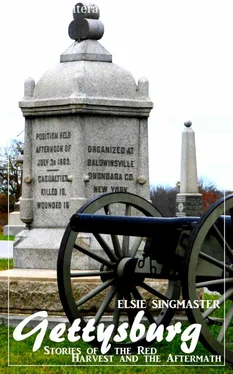Gettysburg Stories of the Red Harvest and the Aftermath by Elsie Singmaster
Literary Thoughts Edition presents
Gettysburg; Stories of the Red Harvest and the Aftermath,
by Elsie Singmaster
Transscribed and Published by Jacson Keating (editor)
For more titles of the Literary Thoughts edition, visit our website: www.literarythoughts.com
All rights reserved. No part of this edition may be reproduced, stored in retrieval system, copied in any form or by any means, electronic, mechanical, photocopying, recording or otherwise transmitted without written permission from the publisher. You must not circulate this book in any format. For permission to reproduce any one part of this edition, contact us on our website: www.literarythoughts.com.
This edition is licensed for your personal enjoyment only. It may not be resold or given away to other people. If you would like to share this book with another person, please purchase an additional copy for each recipient. If you’re reading this book and did not purchase it, or it was not purchased for your use only, then please return to Amazon and purchase your own copy of the ISBN edition available below. Thank you for respecting the efforts of this edition.
Four Score and seven years ago our fathers brought forth on this continent, a new nation, conceived in Liberty; and dedicated to the proposition that all men are created equal.
Now we are engaged in a great civil war, testing whether that nation, or any nation so conceived and so dedicated, can long endure. We are met on a great battle-field of that war. We have come to dedicate a portion of that field, as a final resting place for those who here gave their lives that that nation might live. It is altogether fitting and proper that we should do this.
But in a larger sense, we cannot dedicate—we cannot consecrate—we cannot hallow—this ground. The brave men, living and dead, who struggled here, have consecrated it, far above our poor power to add or detract. The world will little note, nor long remember what we say here, but it can never forget what they did here. It is for us, the living, rather, to be dedicated here to the unfinished work which they who fought here have thus far so nobly advanced. It is rather for us to be here dedicated to the great task remaining before us—that from these honored dead we take increased devotion to that cause for which they gave the last full measure of devotion—that we here highly resolve that these dead shall not have died in vain—that this nation, under God, shall have a new birth of freedom—and that government of the people, by the people, for the people, shall not perish from the earth.
ABRAHAM LINCOLN.
Gettysburg, November 19, 1863.
From the kitchen to the front door, back to the kitchen, out to the little stone-fenced yard behind the house, where her children played in their quiet fashion, Mary Bowman went uneasily. She was a bright-eyed, slender person, with an intense, abounding joy in life. In her red plaid gingham dress, with its full starched skirt, she looked not much older than her ten-year-old boy.
Presently, admonishing herself sternly, she went back to her work. She sat down in a low chair by the kitchen table, and laid upon her knee a strip of thick muslin. Upon that she placed a piece of linen, which she began to scrape with a sharp knife. Gradually a soft pile of little, downy masses gathered in her lap. After a while, as though this process were too slow, or as though she could no longer endure her bent position, she selected another piece of linen and began to pull it to pieces, adding the raveled threads to the pile of lint. Suddenly, she slipped her hands under the soft mass, and lifted it to the table. Forgetting the knife, which fell with a clatter, she rose and went to the kitchen door.
"Children," she said, "remember you are not to go away."
The oldest boy answered obediently. Mounted upon a broomstick, he impersonated General Early, who, a few days before, had visited the town and had made requisition upon it; and little Katy and the four-year-old boy represented General Early's ragged Confederates.
Their mother's bright eyes darkened as she watched them. Those raiding Confederates had been so terrible to look upon, so ragged, so worn, so starving. Their eyes had been like black holes in their brown faces; they had had the figures of youth and the decrepitude of age. A straggler from their ranks had told her that the Southern men of strength and maturity were gone, that there remained in his village in Georgia only little boys and old, old men. The Union soldiers who had come yesterday, marching in the Emmittsburg road, through the town and out to the Theological Seminary, were different; travel-worn as they were, they had seemed, in comparison, like new recruits.
Suddenly Mary Bowman clasped her hands. Thank God, they would not fight here! Once more frightened Gettysburg had anticipated a battle, once more its alarm had proved ridiculous. Early had gone days ago to York, the Union soldiers were marching toward Chambersburg. Thank God, John Bowman, her husband, was not a regular soldier, but a fifer in the brigade band. Members of the band, poor Mary thought, were safe, danger would not come nigh them. Besides, he was far away with Hooker's idle forces. No failure to give battle made Mary indignant, no reproaches of an inert general fell from her lips. She was passionately grateful that they did not fight.
It was only on dismal, rainy days, or when she woke at night and looked at her little children lying in their beds, that the vague, strange possibility of her husband's death occurred to her. Then she assured herself with conviction that God would not let him die. They were so happy, and they were just beginning to prosper. They had paid the last upon their little house before he went to war; now they meant to save money and to educate their children. By fall the war would be over, then John would come back and resume his school-teaching, and everything would be as it had been.
She went through the kitchen again and out to the front door, and looked down the street with its scattering houses. Opposite lived good-natured, strong-armed Hannah Casey; in the next house, a dozen rods away, the Deemer family. The Deemers had had great trouble, the father was at war and the two little children were ill with typhoid fever. In a little while she would go down and help. It was still early; perhaps the children and their tired nurses slept.
Beyond, the houses were set closer together, the Wilson house first, where a baby was watched for now each day, and next to it the McAtee house, where Grandma McAtee was dying. In that neighborhood, and a little farther on past the new court-house in the square, which Gettysburg called "The Diamond," men were moving about, some mounted, some on foot. Their presence did not disturb Mary, since Early had gone in one direction and the Union soldiers were going in the other. Probably the Union soldiers had come to town to buy food before they started on their march. She did not even think uneasily of the sick and dying; she said to herself that if the soldiers had wished to fight here, the good men of the village, the judge, the doctor, and the ministers would have gone forth to meet them and with accounts of the invalids would have persuaded them to stay away!
Over the tops of the houses, Mary could see the cupola of the Seminary lifting its graceful dome and slender pillars against the blue sky. She and her husband had always planned that one of their boys should go to the Seminary and learn to be a preacher; she remembered their hope now. Far beyond Seminary Ridge, the foothills of the Blue Ridge lay clear and purple in the morning sunshine. The sun, already high in the sky, was behind her; it stood over the tall, thick pines of the little cemetery where her kin lay, and where she herself would lie with her husband beside her. Except for that dim spot, the whole lovely landscape was unshadowed.
Читать дальше












